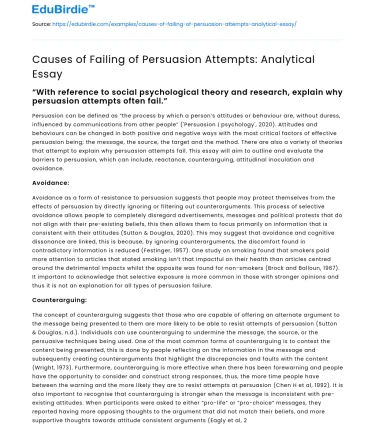“With reference to social psychological theory and research, explain why persuasion attempts often fail.”
Persuasion can be defined as “the process by which a person’s attitudes or behaviour are, without duress, influenced by communications from other people” ('Persuasion | psychology', 2020). Attitudes and behaviours can be changed in both positive and negative ways with the most critical factors of effective persuasion being; the message, the source, the target and the method. There are also a variety of theories that attempt to explain why persuasion attempts fail. This essay will aim to outline and evaluate the barriers to persuasion, which can include, reactance, counterarguing, attitudinal inoculation and avoidance.
Avoidance:
Avoidance as a form of resistance to persuasion suggests that people may protect themselves from the effects of persuasion by directly ignoring or filtering out counterarguments. This process of selective avoidance allows people to completely disregard advertisements, messages and political protests that do not align with their pre-existing beliefs, this then allows them to focus primarily on information that is consistent with their attitudes (Sutton & Douglas, 2020). This may suggest that avoidance and cognitive dissonance are linked, this is because, by ignoring counterarguments, the discomfort found in contradictory information is reduced (Festinger, 1957). One study on smoking found that smokers paid more attention to articles that stated smoking isn’t that impactful on their health than articles centred around the detrimental impacts whilst the opposite was found for non-smokers (Brock and Balloun, 1967). It important to acknowledge that selective exposure is more common in those with stronger opinions and thus it is not an explanation for all types of persuasion failure.
Save your time!
We can take care of your essay
- Proper editing and formatting
- Free revision, title page, and bibliography
- Flexible prices and money-back guarantee
Counterarguing:
The concept of counterarguing suggests that those who are capable of offering an alternate argument to the message being presented to them are more likely to be able to resist attempts of persuasion (Sutton & Douglas, n.d.). Individuals can use counterarguing to undermine the message, the source, or the persuasive techniques being used. One of the most common forms of counterarguing is to contest the content being presented, this is done by people reflecting on the information in the message and subsequently creating counterarguments that highlight the discrepancies and faults with the content (Wright, 1973). Furthermore, counterarguing is more effective when there has been forewarning and people have the opportunity to consider and construct strong responses, thus, the more time people have between the warning and the more likely they are to resist attempts at persuasion (Chen H et al, 1992). It is also important to recognise that counterarguing is stronger when the message is inconsistent with pre-existing attitudes. When participants were asked to either “pro-life” or “pro-choice” messages, they reported having more opposing thoughts to the argument that did not match their beliefs, and more supportive thoughts towards attitude consistent arguments (Eagly et al, 2000).
Attitude inoculation:
An alternative explanation for why persuasion attempts fail is attitude inoculation. Attitude inoculation suggests that by people over coming weak counter attitudinal arguments, they become more capable of resisting stronger and more complex persuasive attempts. McGuire (1964) proposed that the attitude inoculation process mirrors the medical inoculation theory, in that, weakened strains of viruses can be injected into the body in order to have a beneficial impact on our immune systems by making us much more resistant, and even immune, to such viruses later on. Similarly, in attitude inoculation we can become more resistant to future, and more complex, persuasions by being exposed to weaker counterarguments that trigger us to develop our defences and become more competent in regard to counterarguing. The inoculation theory was driven from prior research surrounding one-sided and two-sided messages. The suggestion was that one-sided messages are supportive messages that aim to strengthen pre-existing attitudes whereas two-sided messages present counterargument and refutation of counterarguments (Lumsdaine & Janis, 1953). From this research McGuire (1964) developed the inoculation model has two primary steps, threat and refutational pre-emption, thus a conventional inoculation message starts with a http://europepmc.org/article/med/26903925
Conclusion:
- https://www.ncbi.nlm.nih.gov/pmc/articles/PMC4536373/#B92
- Brock T. C., Balloun J. L. (1967). Behavioral receptivity to dissonant information. J. Pers. Soc. Psychol. 6, 413–428. 10.1037/h0021225
- Persuasion | psychology. (2020). Retrieved 26 October 2020, from https://www.britannica.com/science/persuasion-psychology
- Sutton, R., & Douglas, K. Social psychology (2nd ed., p. 273).
- Sutton, R., & Douglas, K. Social psychology (2nd ed., p. 274).
- Woltman J. L. C. M., Wedel M., Pieters R. G. M. (2003). Why do consumers stop viewing television commercials? Two experiments on the influence of moment-to-moment entertainment and information value. J. Mark. Res. 40, 437–453. 10.1509/jmkr.40.4.437.19393
- Festinger L., Maccoby N. (1964). On resistance to persuasive communications. J. Abnorm. Soc. Psychol. 68, 359. 10.1037/h0049073
- Wright P., Friestad M., Boush D. M. (2005). The development of marketplace persuasion knowledge in children, adolescents, and young adults. J. Public Policy Mark. 24, 222–233. 10.1509/jppm.2005.24.2.222
- Chen H. C., Reardon R., Rea C., Moore D. J. (1992). Forewarning of content and involvement: consequences for persuasion and resistance to persuasion. J. Exp. Soc. Psychol. 28, 523–541. 10.1016/0022-1031(92)90044-K
- Eagly, A.H., Kulesa, P, Brannon, L.A, Shaw, K, & Hutson-Comeaux, S (2000). Why counterattitudinal messages are as memorable as proattitudinal messages: The importance of active defence attack. Personality and Social Psychology Bulletin, 26, 1392-408
- McGuire W. J. (1964). Inducing resistance to persuasion: some contemporary approaches, in Advances in Experimental Social Psychology, Vol. 1, ed Berkowitz L. (New York, NY: Academic Press; ), 191–229
- Lumsdaine, A. A., & Janis, I. L. (1953). Resistance to 'counterpropaganda' produced by one-sided and two-sided 'propaganda' presentations. Public Opinion Quarterly, 17, 311–318.






 Stuck on your essay?
Stuck on your essay?

